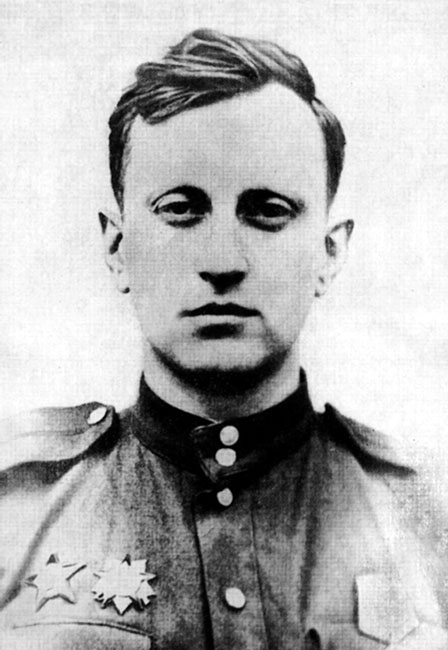Grigorii (Hirsh) Berezkin was born in 1918 in Mogilev, Belorussia. There were many children in his family. His father was a bookkeeper and his mother knitted stockings. After Grigorii completed seven years of school, he began studying at a rabfak (a school for workers). From 1933 to 1938 he studied at the literary faculty of the Minsk Pedagogical Institute. He worked on the editorial staff of various newspapers and published articles in Belarusian and Yiddish. He became a member of The Union of Writers of the USSR in 1939. In April 1941, together with other literary figures in Belorussia he was arrested by the Minsk NKGB (the secret police punishment organs) on the charge of anti-Soviet agitation. On June 26, 1941, when the Wehrmacht forces were approaching Minsk, the prisoners were taken out of the NKVD jail. These arrestees included Grigorii Berezkin, the Yiddish poet Zelik Akselrod, and the Yiddish prose writer Eli Kagan. An order was given for those arrested for political crimes to go to the left and those arrested for political ones – to the right. Eli Kagan decided to go with the “criminals” while Akselrod pulled Berezkin to join the “politicals.” The “criminals” were released and Eli Kagan, concealing the fact that he had been arrested, was mobilized and sent to the front, where he was killed in 1944. The “politicals” were taken out of Minsk. When they were noticed by German tanks, the latter began shooting at them. Akselrod was killed but Berezkin was saved by good luck. Berezkin succeeded in reaching his hometown of Mogilev where, hiding the fact of his arrest, he was mobilized on July 10, 1941 as a “volunteer” in the Red Army. Berezkin fought as a soldier with an automatic weapon in the infantry at Stalingrad, near Kursk and Kiev, in the Carpathians and at the Lwów–Sandomierz Offensive in South Poland. He was wounded twice and by the summer of 1943 had risen to the rank of sergeant. In August 1943 he was awarded the For Valor Medal and in early 1944 – the Order of the Red Star. At some stage he began writing articles for the army newspaper Stalinets. Soon Berezkin was noticed as having literary talent and he became a correspondent of that publication. He ended the war with the rank of junior lieutenant after receiving, in October 1944, another award, the Order of the Patriotic War, 2nd class for taking part, while military correspondent, in a combat operation of a tank brigade.
After the war Berezkin served with the Soviet occupation forces in Germany, working on a Soviet newspaper in German. Nevertheless, in August 1949 on orders from the Minsk MGB (as the former NKVD was then referred to) he was arrested on the same charge that had been leveled against him in 1941, and brought to Minsk. There in the same office and by the same investigator he was accused and sentenced to 10 years in the GULAG. He served several years in the Karaganda and Omsk Provinces. After the death of Stalin and the “rehabilitation” of prisoners, in November 1955 he was released from prison camp and he returned to Minsk. Berezkin then worked as a literary critic on the staff of several Belarusian publications.
Grigorii Berezkin died in 1981.







